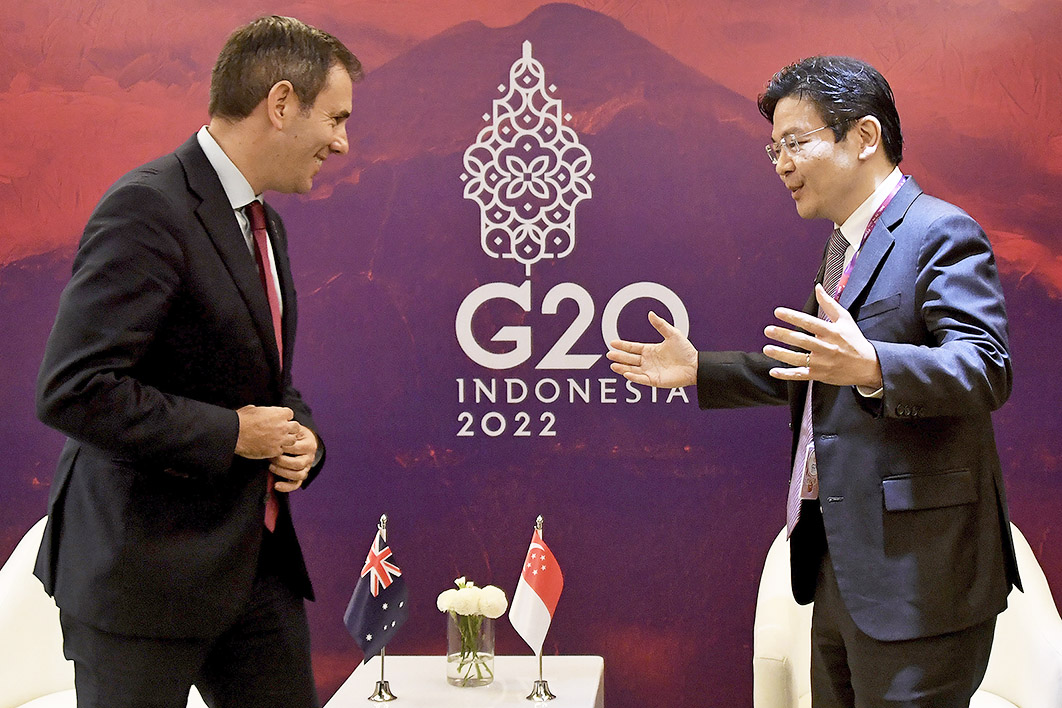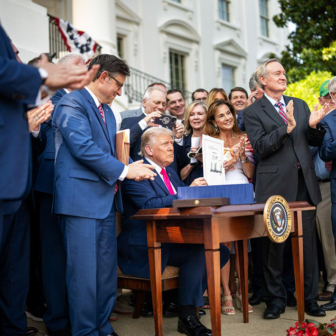In June last year Singapore’s prime minister Lee Hsien Loong named finance minister Lawrence Wong as his deputy and prime minister–apparent, thus ending a leadership search that began soon after Lee collapsed during a televised address to the nation in 2016. Singapore’s tradition of orderly, well-signalled succession seemed to be back on track after the surprise withdrawal of Lee’s first choice, deputy prime minister Heng Swee Keat, in 2021. A year after the announcement, though, Lee is still prime minister and Wong seems oddly content to sit and wait his turn.
In fact, Lee has fallen four years behind the schedule he announced in 2017. By now he should have not just named a successor but also, in 2019, handed over the reins. Indeed, his progress towards retirement has been so lackadaisical that members of his normally acquiescent People’s Action Party, or PAP, are beginning to express their irritation. Former prime minister Goh Chok Tong voiced his own concerns about the pace of succession planning as long ago as December 2017, saying it needed to be settled before the end of 2018, almost five years ago.
Such is Lee’s confidence in his chosen successor, meanwhile, that he has left open the possibility (increasingly a likelihood) that he, not Wong, will lead the party into the next general election, which need not be held until November 2025 but seems likely to be much sooner — and possibly within a few months.
Singaporeans are entitled to wonder why Lee is keeping Wong waiting, but a more forward-looking perspective would focus on Wong’s own motivations. Why is he sitting patiently, as if he doesn’t care how long his boss takes to step aside? What does his extraordinary indifference to the pace of change tell us about the man as a prospective leader? What does it take to get him moving, let alone excited? How is his standing being affected by this delay?
Such complacency would be extraordinary in a competitive government system — a democracy, for instance — where ambitious politicians fight publicly to get to the top. Even within an authoritarian system, this display of passivity is unusual — especially from an intelligent, well-educated and hard-working man who has successfully moved from the heights of Singapore’s civil service to the heights of elite politics. Understanding his behaviour is, I suspect, central to understanding what we can expect from a future Prime Minister Wong.
Wong’s extraordinarily laid-back version of ambition sits in sharp contrast to his style as a manager in the civil service and in government. My conversations with a couple of people who have worked for him make clear that Wong is not only a committed and effective decision-maker, but also a micromanager reluctant to leave subordinates or associates to do their jobs. He routinely insists on the final word both in consequential matters already being handled by professionals paid seven-figure salaries like himself and in trivial matters being handled by people far below his pay grade.
This work ethos is completely compatible with ambition, of course, but it is the ambition of a high-performing administrator rather than a political leader.
In a seminal speech in 1966, former prime minister Lee Kuan Yew, Lee Hsien Loong’s father, described society as a social pyramid with “top leaders” at the apex, a broad base of followers at the bottom, and a “middle strata of good executives” in between. He placed great value on the middle strata, but only as executors of the leaders’ vision. After all, he explained, “the best general or the best prime minister in the world will be stymied if he does not have high-quality executives to help him carry out his ideas, thinking and planning.”
Looking at Wong, I see a “high-quality executive” and a loyal deputy but not a “top leader.” This assessment is evoked not just by the deep wells of patience he is displaying but also by his work history before entering politics, which was composed entirely of civil service and kindred public service roles, including a stint as principal private secretary to Lee Hsien Loong.
This CV might not be problematic if he had at some stage displayed the initiative and risk-taking behaviour associated with leadership and political ambition — or a sliver of contrarian thought that might have separated him from his political colleagues — but there is no evidence of any of these. Indeed, far from engaging in the cut and thrust of politics, Wong boasts of his lack of ambition and his reluctance to put himself forward.
He was not driven to enter politics by ideology, passionate conviction or even self-serving ambition. He did not win his party’s endorsement to stand for parliament by contesting an Australian-style preselection contest or an American-style primary. Like every other member of cabinet, he entered politics in response to an invitation to tea from a select group of people who hold in their gift party endorsement for safe seats in parliament; and it was clearly understood by everyone, including the public, that fast-tracked entry into cabinet was a central element of the deal.
His recruitment had long since been preceded by those years working as principal private secretary to Lee, the ultimate gift-giver. Such are the patron–client bonds constructed during a period of working that closely with a member of the Lee family that Wong probably still considered Lee his boss even during the two years before entering parliament when he was running the Energy Market Authority. Note that Ong Ye Kung, who was the alternative candidate to succeed PM Lee, has also worked for Lee Hsien Loong as his PPS, and Heng Swee Keat, who Wong has replaced as PM Lee’s chosen successor, had been PPS for Lee’s father.
Rather than engaging in backroom politics or alliance building to win the prime ministership, Wong simply accepted yet another gift from his patron and then let the government’s spin doctors weave a narrative that would justify the selection. To be fair, Wong did need to satisfy Lee with his public performance, but judging by Lee’s earlier, failed selection of the hapless Heng Swee Keat to succeed him, that performance was less important than loyalty.
The sequence of events makes Wong’s passivity easier to understand. Rather than thinking of him as having left the civil service to launch a political career, it’s more accurate to say that he accepted a promotion from the civil service into cabinet — a promotion that meant he was still working for Lee Hsien Loong.
I make this observation without wishing to demean Wong or his record of public service. He has proven himself to be a competent minister in several portfolios, and he demonstrated excellent communication skills as co-leader of Singapore’s management of the Covid-19 epidemic. But there is nothing in that record that disturbs the picture of Wong as Lee Hsien Loong’s loyal executive officer, in either the past or the present.
As for the future, if Lee Hsien Loong is anything like his father, then he will undoubtedly stay active in cabinet and the Prime Minister’s Office for as long as his health and acuity permit (and perhaps longer).
Regardless of whether this is a fair assessment of the Lee–Wong relationship, the undeniable reality is that by his (in)actions, Wong is creating that impression. Even without the shadow of his mentor, Wong risked being seen as the “new boy” PM because of his youth (age fifty) and the naked lines of patronage on display. Now we know that former deputy prime minister Tharman Shanmugaratnam will be president, the risk of the “new boy” image sticking is even more acute.
Working in the shadow of both President Tharman and former PM Lee Hsien Loong (who, like his predecessors, will probably be titled senior minister) will make it difficult for him to shake the “new boy” image. This may not be a great problem when addressing the public, but within cabinet it is likely to leave him as chairman rather than prime leader and decision-maker. He may very well find his dealings with his colleagues contaminated by suspicions that he is a mere placeholder.
That’s what happened to Goh Chok Tong, who spent fourteen years as a prime minister working in the shadow of not one but two Lees, father and son. If Wong is still deputy rather than PM heading into the next election, especially if the election is not held for another year or two, then his standing will be irrevocably diminished.
Oddly enough, though, in a Singaporean context this may not present as a serious problem. Many ordinary Singaporeans will likely be content to have a competent and likeable administrator as PM without looking for much more. Wong’s fellow members of cabinet are also unlikely to think too badly of a weakened PM Wong, since they are all playing by the same rules and none of them would rock the boat either.
The more serious consequence is that the unfettered continuation of Lee Hsien Loong’s domination of government will perpetuate a cabinet bubble characterised by widespread conflicts of interest, arrogant unaccountability and timid acquiescence in an established hierarchy of power that Lee once characterised as Singapore’s “natural aristocracy.” True, this litany of negatives is offset by the delivery of a reasonably high standard of professional, if overly bureaucratic, government, but it is well to acknowledge both sides of the coin.
In times of high economic growth, healthy social development, an absence of domestic grievances and a benign international environment, such a list of shortcomings might be tolerable, but not one of those conditions applies today, or is likely to be operable in the medium-to-long-term future.
In this setting, the Lee-dominated bubble will act as a serious drag on both courageous innovation and good governance — exactly the resources the government needs to use in facing the challenges of the new century.
The more immediate problem for a Wong-led government is that social and economic challenges — along with the increasingly common whiff of elite hypocrisy and self-indulgence — are unrelentingly reducing levels of trust in government and generating unique levels of electoral volatility. Silencing and intimidating opponents — even driving them out of the country — might quieten discordant voices, but they do nothing to rebuild trust.
The PAP government has been bleeding domestic political capital for years now — liquidating goodwill and trust in exchange for short-term survival — and the political challenges continue to escalate, scandal-by-scandal and election-by-election.
I could be wrong, but I don’t think “more of the same” and “a safe pair of hands” are adequate responses. •




